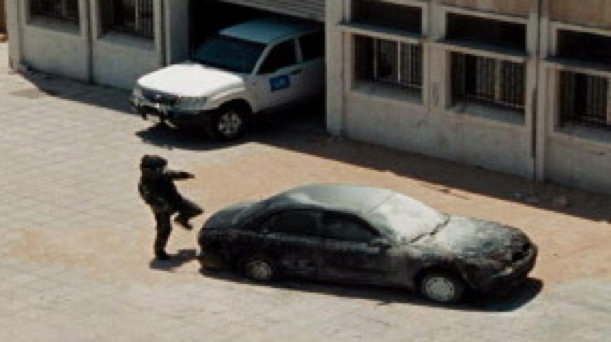"A Different Kind of War Film: The Ethos of the Individual Soldier in The Hurt Locker"
|
Mikal LambdinMikal has a BA in English with a concentration in Writing and Rhetoric from George Mason University. She most recently worked as an Undergraduate Research Assistant for Writing Across the Curriculum, where she wrote research-driven blog posts about composition from a student perspective. She enjoys pushing the envelope when writing by creating her own rhetorical frames and finding connections between dissimilar topics like children’s literature and politics. Mikal lives in Arlington, Virginia, with her doctor-to-be husband and hyperactive cat. Contents"I Don't Know": Leaving Things Out "I Don't Know": Leaving Things Out Cont. "I Wanna Die Comfortable": War is a Game "I Wanna Die Comfortable": War is a Game Cont. "With Me I Think It's One": Man Over Machine |
"I Wanna Die Comfortable": War is a GameJames’s detachment is his most striking rhetorical hallmark, and is directly tied to his defining characteristic: he is addicted to war. The film’s tagline describes James as a hero, but it doesn’t take long to discover that he isn’t. James is an adrenaline junkie. All of his energy and attention is devoted to the thrill of combat and bomb disarmament, leaving him disconnected from essentially everything else. The film opens with a quote from Chris Hedges, who explains that “war is a drug.” This is certainly true for James, and it can also be argued that, to him, war is a game. He is utterly detached from the constant nearness of death, as he cracks jokes and takes needless risks that put both himself and his fellow soldiers in increased danger. James is not necessarily unaware of the peril – he has years of experience disarming bombs, watching others die, and coming close to death himself. Death simply does not bother him. In fact, the threat of death is almost necessary to supply the adrenaline rush that he craves. As the film progresses, it becomes clear that his detachment does not stop there, extending to his family and civilian life. James’s detachment is a means of rhetorically reinforcing his ethos as an addict and thus a unique individual. This next scene is a key example of James’s detachment from the possibility of death. In this scene, James works to disarm a car bomb, accompanied by soldiers Sanborn and Specialist Owen Eldridge. The following exchange occurs just after James has pried open the trunk and discovers several bombs: JAMES. [drops wrench] Oh God [begins removing bomb suit] SANBORN. What’s he doing? ELDRIDGE. I don’t know. ELDRIDGE. What are you doing? JAMES. There’s enough bang in there to send us all to Jesus. If I'm gonna die, I wanna die comfortable.  James’s reaction at the beginning of this scene confirms that he is fully conscious of the danger. His instinctive dropping of the wrench, which clatters harshly to the ground, seems uncharacteristic – it almost contains a hint of fear. This bodily reaction is juxtaposed with the casually disturbed tone of his “Oh God,” as if in response to a spilled cup of coffee: his awareness of death does not constitute any real anxiety. Without hesitation, he begins to remove his bomb suit and the line that follows is definitive of the whole scene, and perhaps James himself: “If I'm gonna die, I wanna die comfortable.” James expresses numerous sentiments in this one line, all connected to his detachment. The statement is clearly humorous, serving to avoid the gravity of the situation by turning it into a joke. At the same time, it acknowledges reality: James is probably right – the bomb suit is insufficient, and thus no longer needed. Yet his embrace of the conditions’ futility is also a result of his detachment. While most would take every inadequate precaution to save their own life, James does the opposite, tossing away his one means of protection and crossing his fingers. Perhaps this scene’s most defining characteristic is its lack of dialogue. After the short exchange quoted above, James spends seven minutes slowly, methodically, and silently searching the car for a detonator. Detachment infiltrates his every action: he tosses his headset when soldiers Sanborn and Eldridge begin to nag him, he raises his middle finger to their continued protests, and he spends a lengthy amount of time disarming the pesky windshield wipers before he gets around to disarming the bomb. This scene is one of many that showcase the script’s minimalist nature, where only one or two simple phrases are contained within extensive action.  Sometimes this action is the intense combat that one would expect from a war movie, but often it is much quieter and more subtle – as in this scene. This technique allows the film to pinpoint a selection of James’s actions and bestow upon them an increased agency. The filmmakers may just be pursuing the oft-repeated cliché that actions speak louder than words, but it works. The experience of watching James fiddle with windshield wipers as tangible death presses ever closer strikes a chord.
|